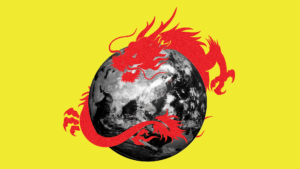 Western companies are kowtowing to China’s Communist authorities, acceding to the ruling party’s curbs on basic liberties, according to reports.
Western companies are kowtowing to China’s Communist authorities, acceding to the ruling party’s curbs on basic liberties, according to reports.
The efforts by Beijing to curtail free speech at companies doing business with China fit into a larger narrative about the nature of Chinese relations abroad. In recent months, China has also sought to support pro-Beijing campus groups and has warned Chinese students abroad against involvement in groups critical of China, The Washington Post reports:
Once American scholars spoke of the virtue of U.S. cultural and economic “soft power” that sought to build support for American ideals around the world. A December report by the National Endowment for Democracy suggested another term for China and Russia,  which it said were projecting “sharp power” that relies on coercion without any effort to “win hearts and minds.”
which it said were projecting “sharp power” that relies on coercion without any effort to “win hearts and minds.”
“As China’s power and influence grows, corporations will have to ask themselves the same question governments have had to: To what degree do the economic benefits of working with China run counter to the values and principles these companies uphold?” said Ely Ratner, a senior fellow for China studies at the Council on Foreign Relations. “The question becomes whether or not these companies want to be complicit in Chinese authoritarianism.”
The Chinese Communist Party emphasized its expanding global ambitions in a remarkable 5,500 character treatise on the front page of Monday’s “People’s Daily,” confirming that Beijing wants to reshape the global order, notes Sinocism analyst Bill Bishop:
This is further evidence of the seriousness of China’s broad global vision. President Xi Jinping sees a remarkable opportunity, enhanced by the Trump presidency and its “America First” policies, to reshape the global order in ways that legitimize the Chinese political system and create more strategic advantages for the China….
 Noting the problems facing the world, such as a “democratic deficit,” “governance deficit,” “development trap,” wealth gap, terrorism and climate change, the article said “the drawbacks of capitalism-led political and economic systems are emerging; the global governance system is experiencing profound changes and a new international order is taking shape.”
Noting the problems facing the world, such as a “democratic deficit,” “governance deficit,” “development trap,” wealth gap, terrorism and climate change, the article said “the drawbacks of capitalism-led political and economic systems are emerging; the global governance system is experiencing profound changes and a new international order is taking shape.”
“This is heady rhetoric, but it is definitely worth noting because something of this nature does not get published in People’s Daily without official sanction,” said Jonathan Sullivan, director of the China Policy Institute at the University of Nottingham. “It reflects the Chinese leadership’s belief that right now is a huge opportunity for China to stake out a global leadership role.”
One year on from President Trump’s inauguration, the liberal international order remains more or less intact — though Trump’s antagonistic style certainly has not traveled well, AFP reports. According to a Gallup poll released Thursday, world approval of US leadership has plummeted from 48 to a new low of 30 percent.
China’s style of Leninist-Mercantilism is unlikely to fit other countries, Bishop adds. But Xi and the Communist Party’s Marxist theoreticians who believe in “historical determinism”, a phrase that appears repeatedly in the manifesto, see America’s retreat as a moment to increase China’s influence in the world.
 The Congressional-Executive Commission on China (CECC) is offering paid Fellowships to graduates of accredited Bachelor’s, Master’s, J.D. Programs, or current graduate-level students. The CECC’s Liu Xiaobo Fellowship was created in honor of renowned Chinese Nobel Prize laureate and prominent political prisoner Liu Xiaobo (right), who died in state custody in July 2017, just weeks after officials reported that he was battling late-state liver cancer.
The Congressional-Executive Commission on China (CECC) is offering paid Fellowships to graduates of accredited Bachelor’s, Master’s, J.D. Programs, or current graduate-level students. The CECC’s Liu Xiaobo Fellowship was created in honor of renowned Chinese Nobel Prize laureate and prominent political prisoner Liu Xiaobo (right), who died in state custody in July 2017, just weeks after officials reported that he was battling late-state liver cancer.
Fellows perform important research support tasks (often in Chinese), attend China-related events, meet human rights advocates and other professionals whose work is focused on China, and assist staff in the drafting of Commission analyses, in addition to other tasks. Click here for CECC analysis of recent developments in the rule of law and human rights in China. Interns may also perform research for the Commission’s Political Prisoner Database, which has been accessible to the public since its launch in November 2004 (click here to begin a search).
Further details are available on the Commission’s website here.







